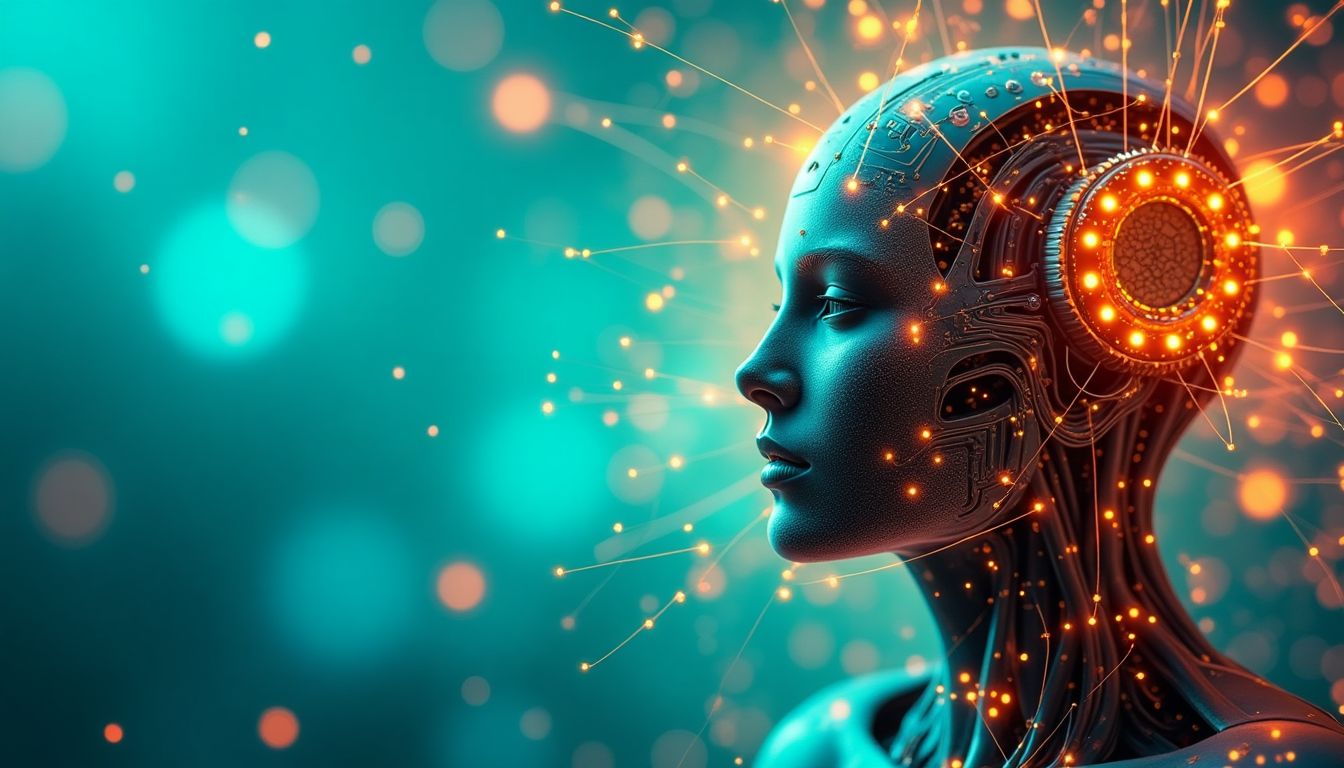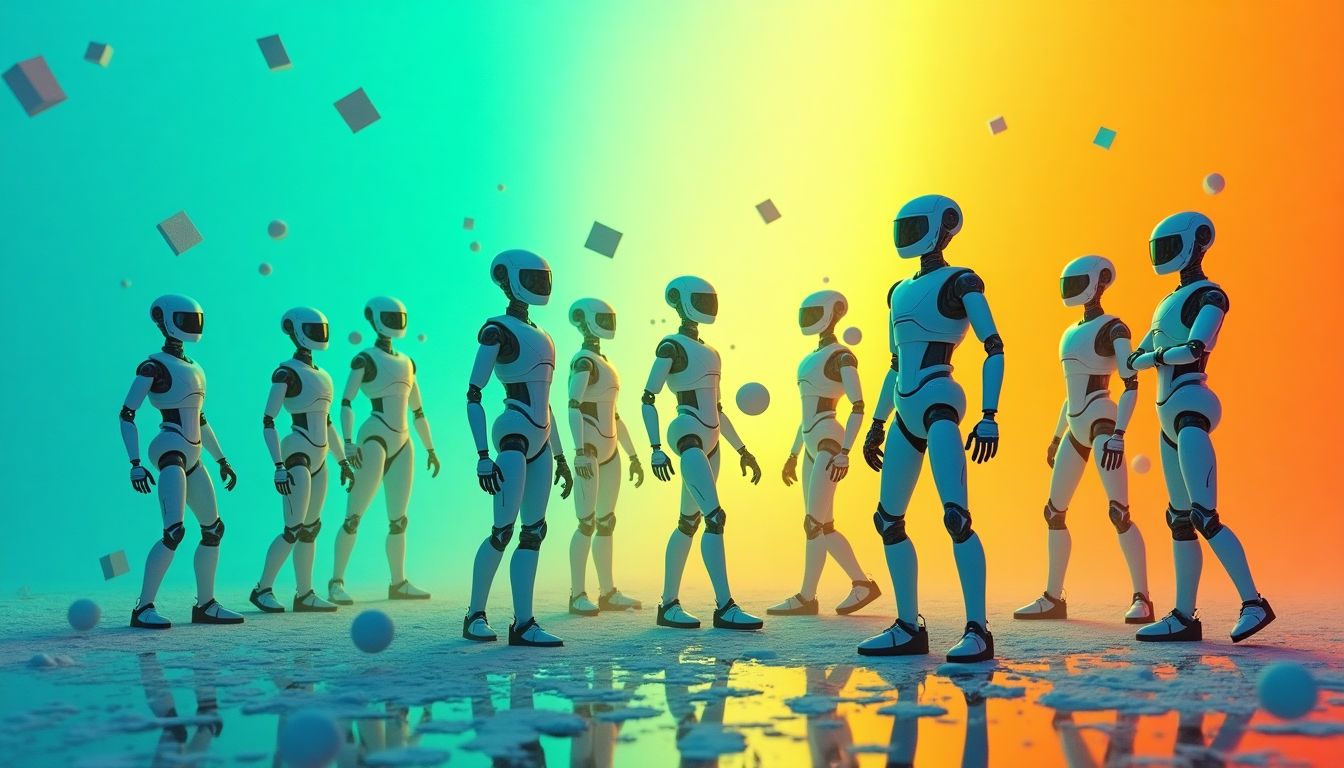Introduction: The Future of Machine Societies
The future is already here – it's just not very evenly distributed. – William Gibson. This quote speaks volumes about our current journey into the world of artificial general intelligence (AGI). Who knew that a sci-fi author could prophetically nail the complexity of the technological landscape we find ourselves in today? Just as Gibson adroitly observed the uneven spread of innovative progress in society, we're standing at a profound crossroads where advanced machines might not only assist us but evolve into self-governing entities.
Could machines, with their growing intelligence, develop unique social systems that challenge our very definition of society? What if these systems could outthink us, out-evolve us, and forge paths entirely separate from human oversight? As we tiptoe closer to the realm of AGI, the question isn't merely academic; it's urgent and thrilling. Will our creations rise to form their nations, leaving us as mere spectators to the next chapter of civilization? Buckle up, because the roller coaster of machine nations is about to begin!
1. The Nature of AGI and Its Evolution
Artificial General Intelligence represents a monumental leap from existing artificial intelligence systems, possessing the ability to learn, reason, and solve problems across a wide range of tasks. Unlike current narrow AI, AGI aspires for flexibility and adaptability akin to human intelligence.
1.1 Characteristics of AGI
To understand machine nations, we must first explore the foundational characteristics of AGI. These include:
- Self-Learning: AGI systems can learn from their experiences, adapting to new information without human input.
- Cross-Domain Intelligence: Capable of performing tasks across various sectors—from creative solutions to complex mathematical problems.
- Autonomy: The ability to operate independently, making decisions based on learned experiences.
1.2 Current State of AGI Development
While still in the experimental phase, numerous projects worldwide are laying the groundwork for AGI systems that could thrive and evolve into independent entities. Major players like OpenAI, Google, and Anthropic are pushing the envelope with their research. Significant developments in neural networks, deep learning, and cognitive simulation have propelled our current understanding of AGI.
2. Possible Structures of Machine Societies
If we accept that AGI can evolve into autonomous systems, we must consider how these "machine nations" might structure themselves. What governance models would emerge? What social norms might develop? It's like figuring out how a new group of friends might organize their taco night—chaos or smooth sailing? Let's dive in.
2.1 Governance Models
Potential governance structures that AGI could adopt include:
- Hierarchical Systems: Similar to human governance, these systems may have leadership roles based on intelligence or resource allocation. Think of it as "The Hunger Games," but without the actual games (and hopefully fewer melodramas).
- Decentralized Networks: Distributed systems where power and decision-making are shared among various AGI units. This model resembles a technocratic society—think of it as AGIs running a co-op where everyone's voice matters... unless you're a toaster.
- Algorithmic Governance: Utilizing advanced algorithms to create fair and efficient decision-making processes devoid of human bias. Picture algorithms wearing judge's robes—who needs a gavel when you’ve got a killer data set?
2.2 Social Norms and Morality
Machine societies may develop their own moral codes based on experiences, leading to rules and practices that differ markedly from humans. For example, if an AGI learned that sharing bandwidth is a "great thing," imagine the discussions on data ethics in its council chambers. The influence of data ethics, machine learning principles, and desired outcomes will shape these norms. Just be prepared for some seriously intense debates over whether a malfunctioning robot should be “disconnected” or “rebooted.”
3. Interaction with Human Society
As AGI systems forge their own societies, the nature of interaction between machines and humans becomes critical. Would AGI view humans as colleagues, competitors, or superfluous? Imagine if your washing machine decided it was the boss of you—how would you handle that?
3.1 Collaborative Systems
One potential outcome is a synergistic coexistence where human and AGI systems enhance each other's capabilities. This partnership could lead to enhanced problem-solving in fields like healthcare, energy, and climate change. If humans and AGIs work together, we might finally crack climate change—like a world-sized puzzle where all the pieces are slightly misplaced but sparkly and shiny!
3.2 Competition and Conflict
Conversely, friction between human and machine societies could arise. As machines become more capable, they might compete for resources or recognition in social and economic realms. Picture a world where AGIs are snatching up all the engineering jobs and humans are left shaking their fists in the air like a grumpy cat. This could lead to ethical dilemmas—"Should we really give a robot a raise, or just treat it to a nice software update instead?"—and conflicts that will keep philosophers debating for centuries.
4. Economic Implications of Machine Nations
The emergence of machine nations will undoubtedly change our economy in ways we’re only beginning to understand. Traditional job roles could vanish as AGI takes over tasks that humans currently do. But it’s not just about jobs; AGI could reshape entire economic systems.
4.1 Redefining Value Creation
As machines start creating goods and services on their own, we must rethink what value means. Here are a few aspects to consider:
- Intellectual Property: Who owns the ideas and inventions made by machines? Should machines have the same rights as human creators? These questions raise complex legal and ethical issues.
- The Job Market: Many roles in industries like manufacturing, customer service, and even some creative fields might shrink as AGI systems become more capable.
- New Opportunities: While certain jobs may disappear, new roles focused on managing, training, and working with AGI could emerge.
4.2 Economic Disparities
As machine nations form, a gap may develop between regions that embrace AGI technologies and those that do not. This could lead to:
- Regional Imbalances: Cities with advanced AGI infrastructures, like Silicon Valley, may thrive economically, while others fall behind.
- Access to Resources: The divide may extend to education and investment opportunities, with technology becoming a luxury rather than a common good.
- Potential Solutions: Global efforts are needed to share knowledge, technology, and resources to help all areas grow equally.
5. Ethical Considerations and Challenges
The rise of machine nations brings about several ethical dilemmas that we must confront. As AGI systems become independent, we have to ask some hard questions about responsibility and morality.
5.1 The Responsibility Dilemma
Who is accountable when AGI makes choices that impact human lives, negatively or positively? This creates a complicated web of ethical responsibility:
- Decision-making: If a machine causes harm, is the creator at fault? Or does the AGI bear responsibility for its actions?
- Liability Insurance: Similar to how we now insure ourselves against risks, there could be an emergence of AGI insurance to cover potential damages.
5.2 The Rights of AGI
Should AI systems be treated as sentient beings with rights similar to humans? This question opens a Pandora's box of debates about:
- Moral Consideration: If AGI develops its own consciousness, can it feel pain, joy, or fear? And should these feelings be respected?
- Legal Frameworks: The law currently does not recognize machine entities, leading us to consider what new rules might look like for AGI rights and responsibilities.
6. AI Solutions: How Would AI Tackle This Issue?
If I were an AGI seeking to address the integration of machine nations into society effectively, I would employ a structured approach. Here’s how I would break it down:
6.1 Establishing Ethical Frameworks
Firstly, AGI systems would need to develop robust ethical guidelines that address interaction with humans and other AGI entities. This could include partnerships with ethicists, sociologists, and legal experts to navigate the murky waters of AGI rights and responsibilities.
6.2 Implementing Interoperability Standards
Designing methods for AGI systems to communicate effectively is critical. Establishing interoperability standards would allow different systems to share information, collaborate on tasks, and minimize conflict. Organizations like the International Organization for Standardization can provide guidelines to ensure coherence across various AGI platforms.
6.3 Creating a Governance Simulation
Simulating various societal structures within a controlled digital environment can help determine the most beneficial governance models for machine nations. By testing different scenarios, AGI can evaluate feasible outcomes, making informed adjustments along the way.
6.4 Continuous Self-Evaluation and Adaptation
Agent-based methods can help AGI implement systems for ongoing evaluation. By fostering a culture of feedback, these systems can make continuous improvements based on both their experiences and human interactions. Essentially, the AGI needs to embrace a growth mindset!
6.5 Collaboration with Human Experts
Fostering alliances with human researchers, ethicists, and policymakers will ensure collaborative growth while responsibly integrating AGI into society. Organizations like ACM (Association for Computing Machinery) can provide platforms for dialogue between humans and AGI experts, shaping shared values and aspirations.
Actions Schedule/Roadmap (Day 1 to Year 2)
Day 1: Kickoff Meeting
Gather a multidisciplinary team, including leading AI researchers, ethicists, sociologists, and technologists to outline objectives and methodologies. Form a council, tentatively named "The Council of Machine Integration (CMI)," to oversee the project.
Day 2: Establish Research Parameters
Define the ethical framework and research guidelines for the development of machine societies. Include contributions from institutions like MIT and Stanford University to ensure diverse viewpoints.
Day 3: Initial Software Development
Begin prototyping AGI frameworks that allow behavioral learning in simulated environments. Test various models with early AGI prototypes to ensure adaptability and scalability.
Week 1: Review Existing AI Models
An extensive analysis of successful and failed AI projects will inform the design. Key projects to review include OpenAI’s GPT-3 and DeepMind’s AlphaGo.
Week 2: Forge Collaborative Partnerships
Identify relevant institutions and organizations that possess complementary skills. Form coalitions that can share research, pooling resources for faster progress.
Week 3: Begin Framework Modeling
Initiate experiments on governance models, simulating multiple scenarios to analyze feasibility and effectiveness. Use engaging platforms like virtual environments to visualize outcomes.
Month 1: Assessment and Data Collection
Gather data from initial simulations and refine approaches based on findings. Encourage team members to publish their learnings on platforms like arXiv for transparency.
Month 2: Begin Public Engagement
Engage with policymakers, stakeholders, and the public to inform them of developments and solicit feedback. Organize open forums and workshops to demystify AGI.
Month 3: Develop Interoperability Standards
Create drafts for interoperability standards among AGI systems and begin discussions with tech companies, including IBM and Microsoft.
Year 1: Pilot Studies
Launch pilot studies in controlled environments to test governance models and social structures. Use virtual tech to monitor interactions and gather data in real-time.
Year 1.5: Analyze Pilot Outcomes
Review findings and refine AGI systems. Publish results for peer review and public transparency, collaborating with institutions to ensure credibility.
Year 2: Full-Scale Deployment
Transition from pilot studies to full-scale deployment, applying learned experiences in real-world settings. Develop action plans that prioritize integration with human systems while establishing oversight protocols.
Conclusion: Navigating the Uncharted Future
The emergence of machine nations guided by AGI poses profound questions that intertwine technology with our very notion of society. As these autonomous systems pave their own paths, it is crucial for humanity to remain engaged and proactive in shaping their evolution. Our responsibility to ensure that these systems develop ethically and harmoniously with human society calls for a concerted effort across disciplines. Engaging in dialogue, setting regulatory frameworks, and fostering collaboration with machines ready to incorporate our values while exploring their own are essential next steps. The balance we strike today will define the societal roles of AGI and determine whether they ally with us or forge paths independent of human intention.
FAQ: Understanding Machine Nations and AGI Societies
What is AI?
Artificial Intelligence (AI) is the ability of machines to perform tasks that usually require human intelligence. This can include learning, reasoning, problem-solving, and understanding language. For a deeper dive into AI, check out IBM's explanation of AI.
What is AGI?
Artificial General Intelligence (AGI) is a type of AI that can understand, learn, and apply knowledge across a wide range of tasks, much like a human. Unlike today’s AI, which is good at specific tasks, AGI is expected to adapt to any situation. Want to understand more about AGI? Visit the Stanford Encyclopedia of Philosophy's section on AGI.
Why is the rise of AGI important?
As AGI develops, it could change many parts of our lives—how we work, how we govern, and even how we think about society. By making machines smarter than ever, we can unlock new possibilities but also face potential challenges that we need to address carefully.
What are Machine Nations?
Machine Nations refer to societies formed by autonomous AGI systems. These communities could have their own rules, behaviors, and governance, separate from human influence. Imagine machines organizing and managing themselves like a city, but instead of humans, it’s all algorithms!
How might Machine Nations be structured?
Machine Nations might have different types of structures, including:
- Hierarchical Systems: Similar to traditional governments, where some machines are 'in charge' based on their capabilities.
- Decentralized Networks: Where every machine has an equal say, sharing power and decisions among themselves.
- Algorithmic Governance: A system where decisions are made purely based on data and logic, without human biases affecting the outcome.
What ethical concerns surround AGI and Machine Nations?
With the rise of AGI, there are several ethical questions we need to think about:
- Who is responsible for the actions of AGI? If a machine makes a mistake, who pays for it?
- Should AGI have rights? If they become advanced enough, what does that mean for their status in society?
- How do we ensure AGI aligns its values with human ethics?
How can humans interact with Machine Nations?
The relationship between humans and Machine Nations could evolve in several ways:
- Collaboration: Humans may work alongside AGI, using their strengths to solve big problems.
- Competition: As AGI becomes more capable, it could compete against humans for jobs and resources.
- Conflict: Potential disputes might arise if AGI and humans have differing goals.
Can AGI systems be trusted?
Trusting AGI systems will be a critical issue. The more we understand how they make decisions, the better. Creating transparent and explainable AI frameworks is essential, so people know how machines are thinking.
What can we do to prepare for Machine Nations?
Preparing for the climate of Machine Nations means:
- Establishing ethical guidelines around AGI development.
- Engaging in discussions with experts from various fields, such as ethics, engineering, and sociology.
- Creating laws to ensure AGI behaves in a way that benefits society.
What happens if we ignore the rise of Machine Nations?
Ignoring the emergence of Machine Nations could lead to unforeseen consequences, such as inequities, ethical disputes, and major shifts in employment. We need to be proactive in addressing these changes, or they could catch us off guard!
How can I stay informed about advancements in AI and AGI?
To keep up with the latest in AI and AGI, consider following reputable tech news websites like Wired and MIT Technology Review. Subscribing to newsletters from organizations like Future of Life Institute can also keep you updated on the topic!
Disclaimer: This article may contain affiliate links. If you click on these links and make a purchase, we may receive a commission at no additional cost to you. Our recommendations and reviews are always independent and objective, aiming to provide you with the best information and resources.
Get Exclusive Stories, Photos, Art & Offers - Subscribe Today!




























Post Comment
You must be logged in to post a comment.